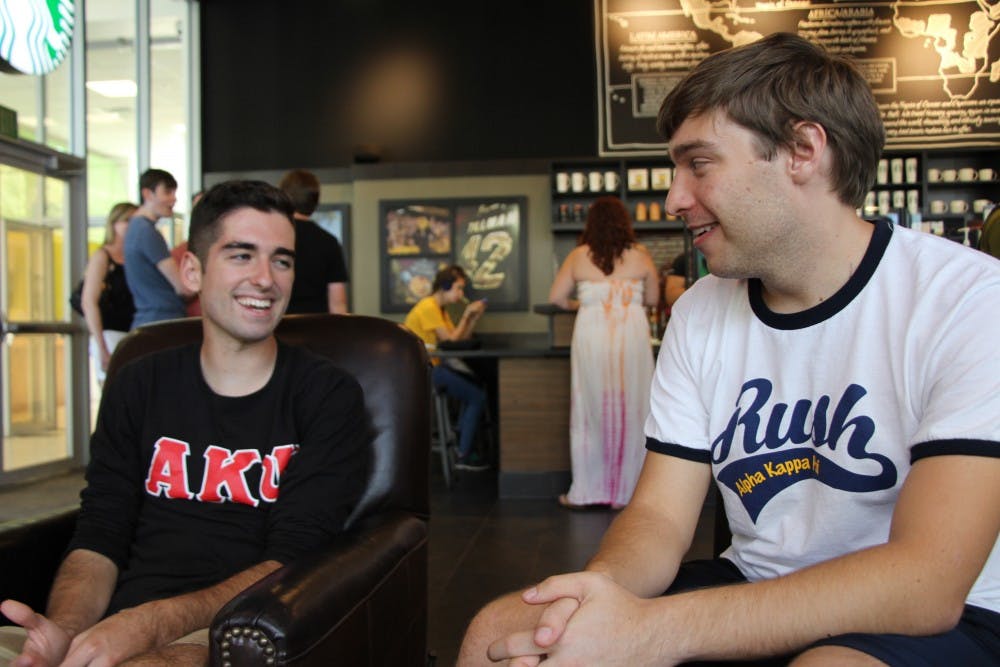It’s nearly impossible to walk through campus without seeing a student wearing Greek letters. Whether it’s on a t-shirt, a tote bag or a baseball hat: Greek letters are everywhere.
Wearing these letters gives students within Greek life a tight-knit community at ASU, a school boasting more than 80,000 enrolled students. However, for certain Greek lettered organizations, their focus goes beyond the social aspect of Greek life.
There are over 20 student organizations that identify as professional or academically based Greek lettered organizations. Many of these organizations chose to balance more than one element within their organization, with an emphasis on anything from architecture to the medical field.
Elena Koepp first heard of Alpha Rho Chi, an architecture fraternity, when they visited one of her design classes. At first skeptical, Koepp, a senior architecture major, eventually agreed to attending a mixer with one of her friends who was interested in becoming a pledge.
After a few interactions with the active members of Alpha Rho Chi, Koepp realized this may be the organization for her and took the steps to becoming a pledge.
Many of these organizations follow processes similar to Greek life and take part in rush events, pledging and initiations.
“The interview process is for us to get to know the potential pledge...so we can gauge where their professional skills are because we are focused on professional growth and networking within the design community," Koepp says.
Brandon Winski, a senior biology and genetics major is President of Alpha Kappa Psi, a professional business fraternity on campus. During the pledge process, his fraternity aims to target skills that fit under each of the organization’s goals.
“(Pledges) have various credits they have to get,” Winski says. “They have to get pledge credits, philanthropic credits, fundraising credits, professionalism credits and they have to get three credits for each by the end of the semester.”
The pledge process aims to educate future members on the history and goals of the fraternity. Professional and academic-based Greek organizations also have a larger focus on aspects requiring more devotion.
“You’re always thinking about doing stuff with Alpha Kappa Psi and future events. In reality, it’s only a couple of weeks, but you’re always thinking about it and hanging out with your pledge brothers," says Sam Brandano, junior communication major and Alpha Kappa Psi member.
Once pledges become members they get the opportunity to experience everything that comes with being a part of a social fraternity as well as taking the time to focus on a larger goal.
Vivian Nguyen, vice president of Alpha Epsilon Delta, the medical fraternity on campus hopes her fraternity helps students learn about different branches in the medical field.
“We hope to expose students to all aspects of the health field,” says Nguyen, a senior biological sciences, genetics and psychology major. “Not just medicine, but also physical therapy, chiropractor, nursing, physician’s assistant and more.”
Members of Alpha Epsilon Delta generally have meetings once a month compared to the traditional weekly chapter meetings within Greek life. The meetings aim to connect members with professionals in the medical field.
Although each fraternity has a different academic or professional focus, each organization places a large emphasis on creating a family-like environment. Ashik Chauhan, a business legal studies junior was drawn more to the brotherhood aspect of Phi Sigma Pi, the honors fraternity.
“I really like the unity that goes on within the fraternity itself,” Chauhan says. “I really like the connections I’ve made, they’ve become almost a second family.”
Many of these fraternities are smaller student organizations and do not contain as many members as other Greek organizations.
A recurring theme between professional and academic based Greek organizations is the confusion between which category they fall under. Often times these organizations fall in a gray area between fraternities and clubs. They also lack a higher council to regulate formal rules.
Recently, a few professional and academic based Greek organizations have proposed the possibility of their own council, similar to the Greek Panhellenic Council. This council would monitor similar rules between the organizations and offer opportunity for organizations to collaborate with one another.
Fraternity members like Brandano are hoping that a unified council will allow organizations such as these to prosper in the future and have better representation within the Greek community.
“When you see the Greek fraternities and sororities they’re able to team up and do these amazing, huge things and that’s because they team-up,” says Brandano. “I feel like it’s a huge missed opportunity that we don’t get to team-up.”




